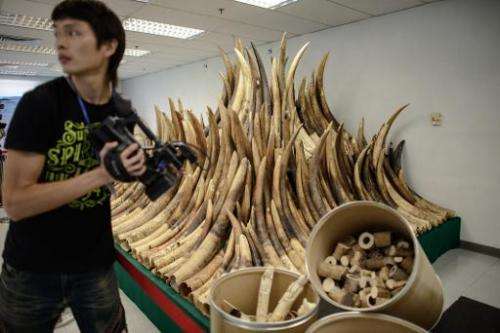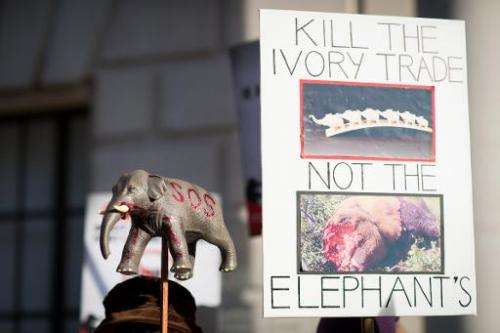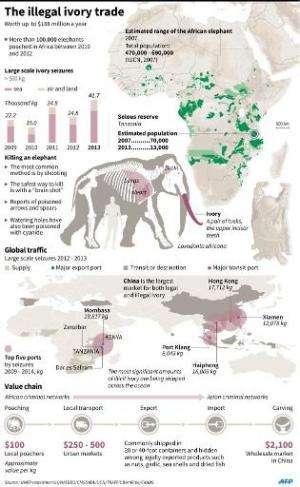A cameraman stands by seized ivory tusks displayed prior to their destruction by incineration in Hong Kong on May 15, 2014
Beijing has imposed a one-year ban on the import of ivory carvings, amid international criticism that rapidly-growing Chinese demand could push wild African elephants to extinction within a generation.
The move, which took effect Thursday, was announced by China's State Forestry Administration in a statement posted on its website.
It comes days ahead of a visit to China by Britain's Prince William, who has campaigned against illegal wildlife trafficking. He is expected to speak on the issue during a stop in southwestern Yunnan province next Wednesday.
China is a signatory to the Convention on International Trade in Endangered Species, but regulated sales of ivory carvings are legal in the country.
It is the world's largest consumer of illegal ivory, with skyrocketing demand leading to the slaughter of tens of thousands of African elephants each year, conservationists say.
Many increasingly wealthy Chinese shoppers buy ivory trinkets as a sign of financial success.
Between 800 to 900 smuggling cases are detected in China every year, according to customs statistics cited by the state-run Beijing Youth Daily, and more than half of businesses dealing in legal ivory are also involved in illegal trade.
A joint report in December from the Save the Elephants and The Aspinall Foundation campaign groups found that more than 100,000 wild elephants were killed from 2010 to 2012, with their slaughter largely fuelled by the "out of control" illegal ivory trade in China.
A protester holds an elephant outside China's embassy in central London on January 24, 2015, during a protest calling for the Chinese government to abolish the trade in ivory
China is making efforts to stem the trade, including closing down at least 10 officially designated factories and jailing hundreds of dealers, but the measures were not going far enough, the report's authors said.
Researchers said prices for raw ivory in China had risen from $750 (550 euros) per kilo in 2010 to $2,100 (1,540 euros) in 2014.
The one-year timeframe for the new ban on carvings "is designed to assess the effects", Xinhua reported.
Factfiles on the illegal ivory trade
© 2015 AFP

























